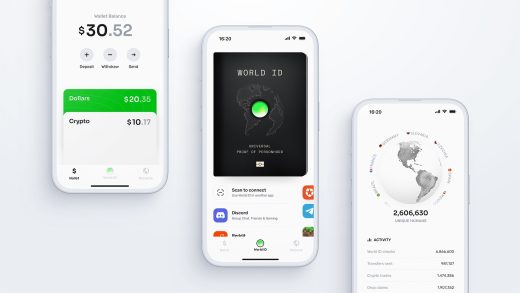Worldcoin is looking like a dud for Sam Altman
Worldcoin is looking like a dud for Sam Altman
The controversial crypto biometrics startup aimed to sign up 1 billion users by 2023. It’s nowhere close to that.
BY Chris Morris
OpenAI CEO Sam Altman has the Midas touch these days on most projects he backs. He made a fortune on the Reddit IPO and was an early investor in both Uber and Airbnb—but not everything he touches turns to gold.
Worldcoin was founded in 2019 by Altman and two others with backing from venture capitalists Andreessen Horowitz and LinkedIn cofounder Reid Hoffman. It quickly turned heads by offering free cryptocurrency tokens to people who would agree to let the company’s shiny, softball-size orb scan and record their iris.
The device, the company said, would then convert that scan into a numerical string that, when combined with an algorithm, would use biometric identifiers to let the scanned person prove they were human in an increasingly AI-driven world. The plan, in 2021, was to sign up 1 billion people by 2023.
As of July 10, 2024, that number stands at 6 million.
The massive shortfall can be blamed on a number of factors. First and foremost, the idea of giving biometrical information to a startup is understandably terrifying to many people, especially in an era where personal data can so easily be hacked. More practically, though, the company is not able to sign up users in China, India, the U.K., and much of Europe. And the company’s WLD token is not available in the U.S. or to U.S. citizens, which takes away the current chief incentive for people to participate. However, the Worldcoin crypto is available to people in Germany, Kenya, and South Korea.
WLD currently trades for about $1.90, according to Coin Market Cap, which is just about what it was worth when it started trading.
Among the concerns of authorities in many countries is the number of minors signing up for the project. “Minors are particularly vulnerable and are subject to special protection by the European and national legislation because they may be less aware of the risks, consequences, and guarantees of the processing of their personal data and their rights,” said the Portuguese Data Protection Authority in March, when it suspended Worldcoin’s scanning operations.
Worldcoin claims its orb is designed so that no one, including the company, can identify you from the scan since it uses an advanced privacy cryptography called zero-knowledge proof.
Worldcoin is hardly the only group gathering this sort of data, too. Airport skip-the-line service Clear uses facial, iris, and fingerprint biometrics to verify the identity of users. Apple’s Vision Pro uses a technology called Optic ID, an iris scanner, to secure authentication. And India’s government has Aadhaar, a biometric database covering 1.3 billion people, which it uses to help those people access social and financial services.
Altman, though, can be a polarizing figure—and recent comments of former OpenAI workers, who expressed significant concerns about safety protocols at the company behind ChatGPT, potentially cast a shadow over Altman’s other projects, including Worldcoin.
Still, 6 million signups is hardly a figure to ignore, especially given the limitations on where Worldcoin can actively recruit sign-ups. Should additional countries warm to the idea of a humanity authenticator, Altman could once again prove the skeptics wrong.
ABOUT THE AUTHOR
(12)



